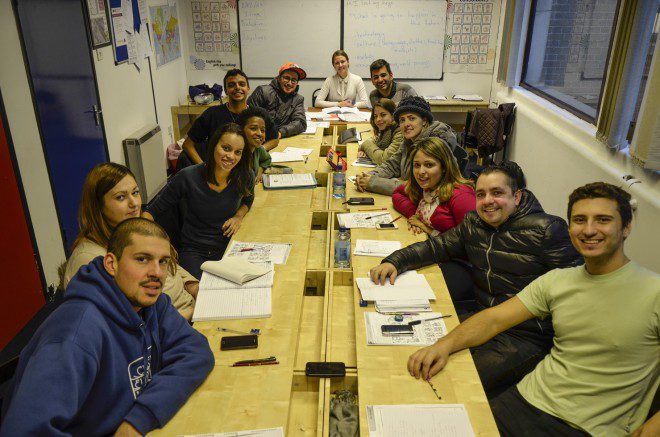Decidi enfrentar o intercâmbio quase aos 40
7 anos atrás
Quanto custa um intercâmbio?
Não vendemos pacotes e nem somos agência,
mas podemos te colocar em contato com elas.
Os desafios daqueles que decidem encarar o intercâmbio na maturidade

Como é fazer intercâmbio depois dos 40 na Irlanda. Arquivo Pessoal
Por Fabiano de Araújo
Minha mãe sempre me ensinou que “a missa se espera na porta da igreja”, e eu acabo aplicando essa “filosofia” em diversas situações, de modo que no meu primeiro dia de aula eu não poderia ter fugido disso, com 20 minutos de antecedência, lá estava eu pronto para a luta.
Sala vazia… entro, largo o meu material e começo a andar pela sala olhando todas as figuras e cartazes como se estivesse analisando quadros em alguma galeria de arte. O porquê da “análise”? Mais uma vez: tudo em inglês e eu procurando me adaptar à nova realidade.
Não demora muito e meus colegas começam a chegar, diferentemente do Brasil, onde em um cursinho de inglês qualquer todos entram e cumprimentam-se em português. Aqui basta um “Hi”, pois nunca se sabe de que país é o colega.
Todos os alunos na sala, maioria muda, sem nenhum assunto. Coisas típicas de um primeiro dia de aula. De repente surge uma linda jovem russa, com uma cara tão angelical que chegava a se assemelhar a uma boneca de porcelana, mas beirando os seus 27 anos e se apresentando como a professora da turma.
Ela foi muito simpática desde o primeiro momento, tratando todos os alunos de igual para igual, sem se importar com o quarentão ou com o bebezão da turma; a atenção dispensada a cada um é a mesma. Ou seja, se você teme, como eu temia, sofrer alguma discriminação por ser mais velho, descobrirá muito cedo que isso é coisa da nossa cabeça. As pessoas, na verdade, dão muito menos importância a isso que nós mesmos.
A dura realidade
Após as apresentações descubri que muitos dos meus colegas eram brasileiros e que as idades oscilavam entre 21 e 29 anos. Confesso que nesse momento o fantasma dos quase 40 me assustou novamente. Veio aquele questionamento recorrente: “o que é que eu estou fazendo aqui? será que fiz a escolha certa?”
Depois de uns 20 minutos de aula comecei a entrar no clima e simplesmente nem percebi quando essas inseguranças com relação à idade sumiram.
É claro que o ritmo é outro, principalmente para quem está muito tempo afastado da sala de aula. Demora um pouco, mas tento sempre acompanhar. E é aí que surge mais uma insegurança: aquela de parecer bobo por não saber coisas que a garotada está tirando de letra. Para eles, é natural, pois já estão inseridos num contexto em que a língua inglesa é amplamente utilizada. Enquanto isso, eu continuo tentando me lembrar do verbo “to-be”.
Quando me dou conta de que o desafio que me propus parece muito maior do que eu imaginava, costuma bater um desânimo. Entretanto, quando reflito, lembro-me que eu não estou participando de uma gincana ou de uma queda de braço, mas que estou aqui para aprender, mesmo que seja em um ritmo mais lento. O fato é que tenho que trabalhar de acordo com a minha realidade, isto é, de acordo com a velocidade em que desenvolvo as minhas competências no novo idioma.
Aos meus amigos que no final de semana já conseguirão rumar para níveis mais alto, meus parabéns. Tenho certeza de que também chegarei lá. Maybe, na próxima semana!
O papel de paizão

Classes mistas ajuda na adaptação durante as aulas de inglês. Foto: Arquivo Pessoal
Sabe aquele medo que mencionei de ser visto como bobo por ser, em alguns momentos, menos desenvolto nas atividade? Isso logo é recompensado pelo fato de existir um respeito natural dos mais jovens por aqueles que são mais velhos. Rapidamente percebi que o fator “idade” também pode ser positivo.
Na minha tuma, por exemplo, me tornei o “pai” da sala e todos os colegas acabaram me tratando com mais respeito. Percebo o carinho, a atenção e paciência que muitos têm em me ajudar. Várias vezes me vi “pego pelo braço” por alunos mais novos que se preocupavam em parar um ou dois minutos e explicar o que havia ficado confuso na aula.
Eles não comentam, mas percebem que nós, mais velhos, temos mais dificuldade para entender certas palavras e significados, mas nem por isso nos desmerecem.
Estudar numa sala com alunos alguns — às vezes muitos — anos mais jovens que você, te faz recordar o terceirão do segundo grau. Rolam paqueras, há o colega que chega atrasado, os alunos que faltam pelo fato de a noite anterior ter sido badalada… uma típica vida de jovem, mas não um qualquer, senão aquele que sai de casa para estudar fora. Nesse momento percebemos a diferença na forma de encarar essa experiência que é o intercâmbio. Enquanto nós, mais velhos, vemos nisso a oportunidade de correr atrás do que talvez devêssemos ter feito antes, os mais novos geralmente encaram como uma chance de viver livre do controle dos pais. Não digo com isso que eles estão errados, pelo contrário: cada um tem a sua própria experiência e seus próprios objetivos. Eles estão aproveitando a vida da maneira que querem, como nós também já fizemos no passado, o que também faz parte dessa experiência no exterior.
Seja com quase 40, 30, ou mesmo aos 20, o intercâmbio sempre terá algo — além da língua — a nos ensinar. É intenso para todo mundo! Pouco a pouco vamos colecionando uma série de aprendizados, que algumas vezes podem se resumir na percepção de que deveríamos ter aproveitado melhor os bons tempos da juventude. Mas o que importa no final de tudo é que nunca é tarde para correr atrás do tempo perdido. No meu caso, esse tempo é agora, no meio dessa turma jovem, o que me faz voltar aos tempos de escola, com a diferença de ter a maturidade dos 40 e disposição para aprender uma segunda língua, o inglês.
_____________________________________________________________________
English Version:
Back to school at almost 40
My mother always told me “we should always arrive on time”, and I have up applying this “philosophy” in different situations in my life. It was not different on my first day of classes, and I was there 20 minutes early. Therefore, I was there, ready for the fight!
The classroom was empty. I came in, left my things on the table and started walking around the room looking at all the pictures and posters as if I was analyzing paintings in an art gallery. Why this “analysis”? Once again: it was all in English and I was trying to adapt to this new reality.
It didn’t take long and my classmates started to arrive. Unlike in Brazil, where in any English course everyone would come and start greeting each other in Portuguese, they just said a shy “Hi”, because we didn’t know what country we here from.
All the students were are now in class, most of them still silent. Then the typical things from a first day of school started, and suddenly she was a beautiful young Russian woman, came in with an angelic face that resembled a porcelain doll, around 27 years of age and introduced herself as the teacher of the class.
She was very friendly right from the start, treating all the students as equals and with care, regardless of their age. So if you were afraid, as I was, that you might have fear suffer any discrimination for being older, you would have discovered right at the beginning that this was are in your head.
The harsh reality
After the presentations, I found out that many of my classmates were Brazilian like me, and their ages ranged from 21 to 29. I confess that at that moment, the “ghost” of being almost 40 scared me again, and again these questions kept recurring: “What I’m doing here? Have made the right choice?”
After about 20 minutes of class, I realized these insecurities regarding age had simply disappeared.
It’s important to be aware that the pace in the classroom might be different from what you’re used to, especially if you’ve been away from school for a long time like me. Sometimes it takes me more time, but I always try to follow everyone else, and therein arises another insecurity: that you may sound silly for not knowing things that the kids are getting easily. For them it is natural, because they are already in a context where English is widely used. Meanwhile, I keep trying to remember the verb “to-be”.
When I realize that what I’m challenging myself may look much bigger and harder than I imagined, I usually get a little discouraged. However, when I reflect about it I remember that I’m not participating in a competition or an arm wrestle, but that I’m here to learn, even if at a slower pace. The fact is that I have to work according to my reality, that is, according to the speed at which I develop my skills in the new language.
To my friends that will be able to move to a higher level on the first weekend, congratulations. I’m sure I’ll also get there. Maybe next week!
The big father
You know that I mentioned before the fear of being seen as silly for being sometimes less jaunty in the activities, right? But this situation is soon rewarded by the fact that there is a natural respect from the younger to those who are older. I quickly realized that the “age” factor can also be positive.
In my class, for example, I`ve become sort of their “father” and all my colleagues just treat me with more respect, and I enjoy their love, attention and patience helping me. Many times, they stopped what they were doing to “take me by the hand” and try to explain to me what had been confusing during the class.
They don’t say anything, but they kind of know that we, who are older, have a little more trouble understanding certain words and meanings, they don’t discourage us.
Studying in a room with some students sometime a lot younger than you makes you remember your high school years. There are flirts, there is the classmate who always arrives late, the students who will miss the class because last night was too intense… a typical life of a young person, but not just any person – someone who left home to study abroad. At this point, we see the difference in the way everyone looks at this experience that is the exchange program. While we who are older see it as an opportunity to go after what perhaps we should have done before, the younger ones usually see it as a chance to live free from their parents. Moreover, I do not think that they are wrong. Quite the opposite: each one has their own experience and their own goals. They are enjoying life the way they want to, as we have already done in the past, which is also part of this experience abroad.
Being almost 40, 30, or even being 20, the exchange will always have something beyond just a new language to teach us. It is intense for everyone! Little by little we are collecting a series of learnings, which sometimes can be summarized in the perception that we should have used better the good times of our youth. But in the end what really matters is that it’s never too late to realize the lost time. In my case, it is now in the midst of this young group, which brings me back to my school days, with the difference of having the maturity of 40 year old and the willingness to learn a second language, the English.
Fabiano de Araújo é gaúcho de carteirinha, mas catarinense de coração. Formado em Comércio Exterior, trabalhou 10 anos com exportação. Um belo dia resolveu largar tudo e encarar um intercambio próximo dos 40 anos, como forma de entrar na melhor idade realizando sonhos. Amante por viagens inesperadas está sempre com uma mochila pronta para encarar desafios. Resolveu compartilhar de sua aventura com os demais por acreditar que nunca é tarde para realizar sonhos.
Quanto custa um intercâmbio?
Não vendemos pacotes e nem somos agência,
mas podemos te colocar em contato com elas.
Veja também
É possível fazer intercâmbio com criança na Irlanda?
Este artigo foi útil?
Você tem alguma sugestão para a gente?
Obrigado pelo feedback! 👋
O que ver em seguida
-
Uma em cada três empresas contrataram graduados do ensino superior na Irlanda
Notícias
Uma em cada três empresas contrataram graduados do ensino superior na Irlanda
Uma nova edição do National Employer Survey, lançada nesta semana pelo...
5 dias atrás
-
Dicas práticas na chegada para o intercâmbio na Irlanda
Planeje seu Intercâmbio
Dicas práticas na chegada para o intercâmbio na Irlanda
Que tal dicas práticas para quando você chegar à Irlanda para fazer...
2 semanas atrás


























